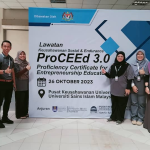In Malaysia, micro-enterprises and family-run businesses form the backbone of the local economy. Often driven by a desire to uplift family members and create sustainable livelihoods, these businesses embody the true spirit of gotong-royong and ukhuwah . However, despite their noble intentions, micro family businesses frequently face unexpected legal and regulatory challenges.
One such heart-wrenching case is that of Che Nom, a small business owner by becoming a full-time content creator primarily for Youtube channel. The case went viral when she received a legal notice for allegedly failing to safeguard employee welfare. The employee is her own niece whereby she has been hired on the ticket of to help the family member. Despite providing care, training, and financial support, Che Nom was reported to the Department of Labour (Jabatan Tenaga Kerja) by her niece. The process of the appointment and payment was unknown by the public but Che Nom mentioned that she pays ‘fixed monthly income’ to her niece. This situation reflects the growing tension between formal employment regulations and the informal dynamics of family-run micro businesses.
What is a Micro Family Business?
A micro family business refers to a small-scale enterprise typically owned and operated by family members, often with minimal employees (usually less than five). These businesses are commonly home-based or operate in a small physical shop, offering services or products within their local community. The primary motive often extends beyond profit-making to include family welfare, skill development, and community support. Unlike Small and Medium Enterprises (SMEs) with formal Human Resource departments, micro family businesses rely on trust, kinship, and informal agreements.
The Core Issues Faced by Micro Family Businesses
1. Blurred Lines Between Family and Employer-Employee Relationship
In Che Nom's case, the niece was not just a worker but someone she had raised like her own child. Many micro businesses employ family members informally, offering flexibility, leniency, and personal support that would be unthinkable in a corporate setting. However, from a legal standpoint, paying a fixed salary—even out of goodwill—can be interpreted as establishing a formal employer-employee relationship, which triggers compliance obligations under employment laws.
2. Rigid Labour Laws Not Tailored for Micro Businesses
Malaysia’s Employment Act and related labour policies are designed with formal businesses in mind—companies with structured contracts, HR departments, and the capacity to process regulatory compliance. Micro family businesses, which function on personal trust and flexibility, often lack the resources to navigate these bureaucratic demands.
Mandatory contributions to EPF, SOCSO, and adherence to JTK’s employment guidelines become complicated when the “worker” is a niece, nephew, or elderly family member helping out part-time.
3. Goodwill Actions Misinterpreted Legally
Che Nom’s goodwill in term of providing full salary during extended leave, paying for Umrah trips, offering personal care while admirable, became problematic when viewed through a formal labour lens. The system struggles to differentiate between genuine familial assistance and formal employment obligations.
4. Lack of Awareness and Guidance for Micro Business Owners
Many micro business owners are unaware of the fine print of labour laws, assuming that informal family arrangements do not fall under regulatory scrutiny. The sudden shock of legal action, like in Che Nom's experience, stems from this gap in awareness and the absence of a clear channel to seek advice or compliance assistance tailored for micro family businesses.
Impacts of Regulatory Challenges on Micro Family Businesses
- Emotional Strain: Being reported by a close family member, despite acts of kindness, can cause deep emotional trauma and break family ties.
- Financial Burden: Legal proceedings, potential fines, and forced compliance with formal employee benefits can financially strain already thin margins.
- Discouragement from Helping Family: Fear of legal repercussions might discourage small business owners from employing and supporting family members in the future.
- Reduced Entrepreneurial Spirit: Over-regulation may dampen the entrepreneurial motivation among micro-entrepreneurs who operate based on trust and community spirit.
Based on the issues and impacts of challenges on micro family business, below are proposed solutions to micro family business:
1. Creation of a ‘Family Employment Declaration’ Mechanism
Malaysia should introduce a specific framework under JTK or SME Corp where micro business owners can officially declare family members who are working in a flexible, informal capacity. This declaration could outline the familial relationship, the informal nature of the work arrangement and a mutual understanding that the employment terms are not equivalent to corporate employment structures. This document would provide legal clarity and protect both the employer and the family member involved.
2. Micro Business Labour Flexibility Policy
Policymakers should develop a separate category within employment regulations that recognises micro businesses with fewer than 5 workers, particularly those employing family members. This policy should allow for flexible employment contracts, offer exemptions or simplified processes for EPF/SOCSO contributions for informal family employment, and focus on mediation and education rather than immediate legal enforcement when disputes arise.
3. Enhanced Awareness Campaigns
Government agencies should conduct educational programs targeted at micro business owners, explaining when a family employment relationship legally constitutes an employer-employee relationship, simple guides on compliance for micro businesses and rights and responsibilities of both parties in a family business context. This would prevent situations where business owners unintentionally breach regulations due to ignorance.
4. Alternative Dispute Resolution (ADR) for Family Employment Conflicts
Instead of rising every complaint to a legal proceeding, there should be a designated ADR mechanism for family business disputes. Mediation sessions could be offered as a first step, focusing on restoring family ties and achieving a mutually agreeable resolution without the need for harsh legal penalties.
5. Revising the Definition of 'Employee' for Micro Enterprises
The definition of 'employee' in employment laws needs a contextual interpretation when applied to micro businesses. Lawmakers should consider adding clauses that differentiate formal employment with structured job descriptions and benefits and informal familial assistance arrangements that are more flexible. This nuanced approach would help micro entrepreneurs like Che Nom avoid being penalized for acts of goodwill.
Conclusion
Che Nom’s story is not an isolated incident, it reflects a widespread challenge faced by many micro family businesses across Malaysia. The existing legal and regulatory frameworks, while important for protecting workers’ rights, must be recalibrated to consider the unique realities of family-run micro businesses.
Malaysia’s aspiration to nurture entrepreneurship must be matched with a supportive and understanding regulatory environment that does not penalize small business owners for helping their own families. Through flexible policies, awareness initiatives, and alternative dispute mechanisms, the nation can create a balanced ecosystem where micro businesses thrive without compromising on basic worker welfare.
My personal opinion based on the case of Che Nom, business is business, family is family and if we want to setup a family business we should differentiate between family and business. And of course, to follow the rules and regulation in the particular place. As for the regulator, this issue might become a stepping stone to craft a model that concern more on the establish and survivalist of family business and micro size of business.










